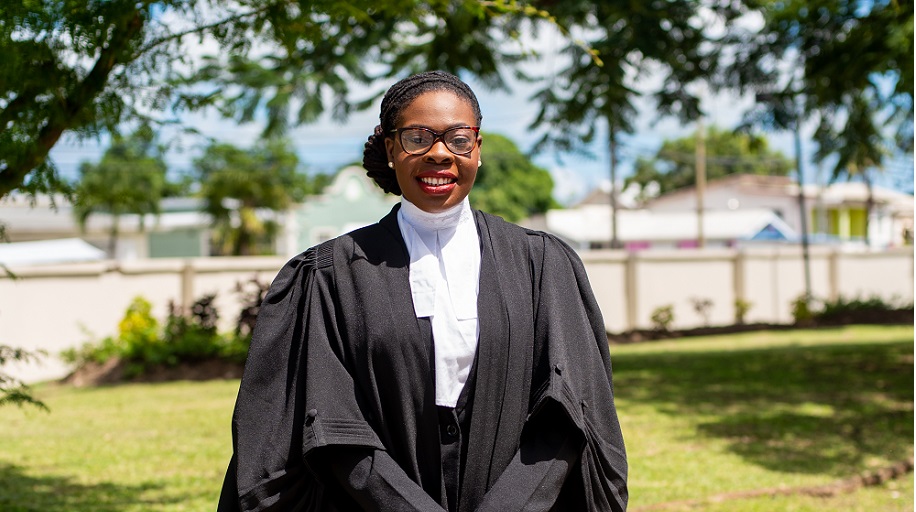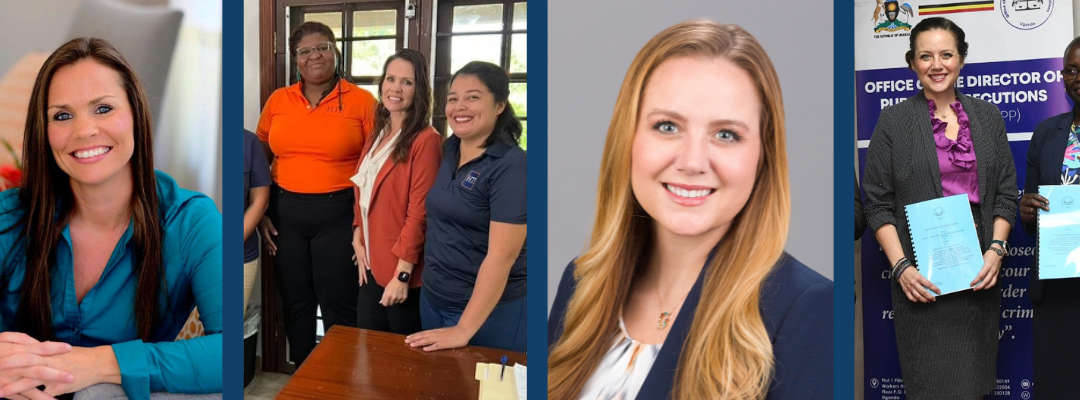By: MOLLY WICKER
Attorney Cherisse Francis recently started as the Judicial Law Clerk to Justice Antoinette Moore, the Designated Trafficking in Persons (TIP) Justice on the Supreme Court of Belize. In this role, Francis is based in Belize for one year, where she will assist Justice Moore with legal research and writing, and support the work of the Court with relevant briefings and summaries. This position is funded by the Institute as a part of its ongoing effort to support the Belize judiciary and how it handles cases of trafficking in persons. She will also assist the Institute with research and writing projects related to Belize TIP law and practice and assist with various TIP training events in Belize.
Francis is an internationally-trained lawyer from Barbados. She recently completed a Master of Laws degree in Human Rights and Criminal Justice at the University of Aberdeen in Scotland, where she graduated with distinction. She is also a graduate of the University of the West Indies (2015) and Hugh Wooding Law School in Trinidad and Tobago (2017).
Prior to starting as a Judicial Law Clerk in Belize, she was the Analysis, Coordination, and Human Rights Intern for the United Nations Resident Coordinator’s Office for Barbados and the Organization of East Caribbean States (OECS) . She has also been actively involved in youth development and human rights education.
Cherisse Francis recently spoke with Molly Wicker to share about her experience in anti-trafficking work.
Q: What led you to anti-trafficking work?
A: In the Caribbean, human trafficking was almost an unspoken part of the culture and something that was generally overlooked. As a teenager, I was heavily involved in youth development work and advocacy. This exposed me to the realities of some young girls in my country whose mothers often ‘prostituted’ them as a means of providing for the household. Additionally, I began noticing that periodically teenage girls would go missing and never be heard from again. In my inquisitive mind, I always wondered if they could have been victims of human trafficking. However, at that time there was no research to substantiate my question, and I was not in a position to do the necessary research. As I advanced in my academic career, I began studying sociology and law, which involved a closer examination of this issue. When I decided that I wanted to pursue law as a career choice, I knew that human rights would be my focus. Anti-trafficking work allows me to work in a field of law that is grossly underdeveloped in the region while contributing to the reduction of human rights violations.
Q: What surprised you most about human trafficking?
A: What surprised me most was the extent to which the peculiarities of the jurisdiction play on the way that human trafficking happens in that country. For example, in Belize, I have observed that cultural perceptions of women and girls, the education level, and its geographical position have all contributed to the prevalence of trafficking in persons. It also surprised me how much of a cycle trafficking is. I have noticed that in many instances victims of trafficking who have been exploited once are much more likely to be exploited again or end up in vulnerable situations.
Q: What do you wish people knew about the reality of human trafficking?
A: I wish people knew that anybody can fall into the vulnerabilities of human trafficking. Many times young people, often females, fall victim not because of a lack of intelligence but because of a lack of opportunity and a desire to make life better for themselves and their families. It is easy for persons not working within the field to question how persons could let themselves become victims. What I have observed in practice and read in theory is that the traffickers either directly or indirectly establish a position of trust as friends, family members, or even partners. They will then manipulate and exploit this emotional or financial position of trust to bring the victims into the cycle.
Q: What gives you hope to continue working in this field?
A: Since I have started working in the Supreme Court in Belize, I have noticed that there is an increasing emphasis on trafficking in persons. Although there are many areas for improvement within the system, the many like-minded individuals who are constantly working to promote change through education, research, and tangible efforts really gives me the hope to continue working in this field.
Additionally, it’s not often as a lawyer that you have the opportunity to see your efforts truly blossom into policy changes and further into life changes for affected persons. Trafficking in persons is one area, which still has room for exploration and development.
Q: What will you be doing in Belize?
A: In Belize, I will mainly be assisting Justice Antoinette Moore with legal research and writing. Ideally, when TIP cases arise for trial this would be a large portion of my work. Thus far, I have engaged TIP cases by providing summaries to ease the burden of the Bench and by conducting research on trafficking in persons in Belize and within the Caribbean region. My wider work has included a large amount of legal research and the preparation of summaries and memoranda for Justice Moore. This is a unique opportunity to engage my love for legal research and writing while remaining true to my human rights background.
Q: What excites you most about working in Belize?
A: Working in Belize presents me with the amazing opportunity to not only gain valuable professional experience but also immerse myself in different cultures. Whenever I move to a new country it is always important for me to understand the way of life of the people there – their food, music, and life every day. Presently, I am learning about the people and places in Belize. Having this knowledge better equips me to do my job well.




